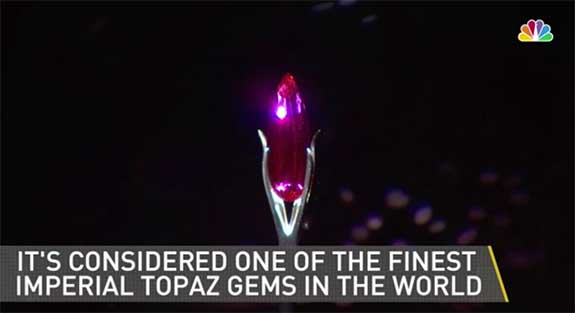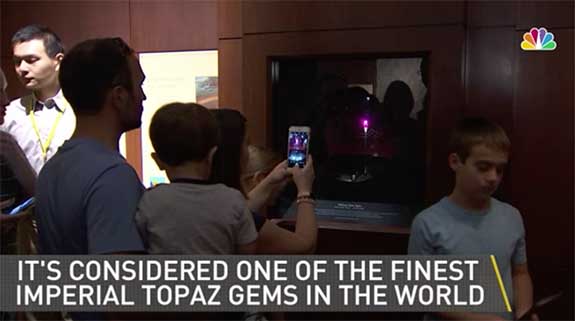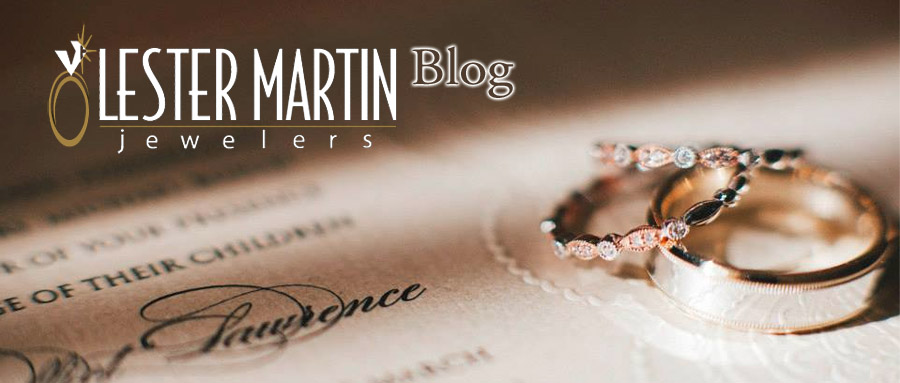September 24th, 2018
An extraordinarily rare 48.86-carat vibrant red topaz is the newest member of the Smithsonian's National Gem Collection. The teardrop-shaped gem, which was acquired for the museum by philanthropist Coralyn Wright Whitney, made its debut this past Thursday at the National Museum of Natural History in Washington, D.C.

Dubbed the "Whitney Flame Topaz," the gem is described by Smithsonian curators as one of the finest examples of imperial topaz in the world. Imperial, or "precious," topaz is typically golden-orange in color, but the vivid red hue of the Whitney Flame is even more unusual and highly prized.
The red color is the result of trace quantities of chromium that were incorporated into the original topaz crystal as it grew in the earth. The Whitney Flame was sourced more than 50 years ago at the topaz mines of Ouro Preto, Brazil.
“Of all the topaz found in that locality, only about a percent or two is gem quality," Smithsonian minerals curator Jeffrey Post told Smithsonian.com. "And of those one to two percent, maybe one percent of those have a deep enough red color that they could be marketed as red topaz.”

“The color and beauty of this gemstone is astounding," Post continued. "You have to see it to believe it. The Whitney Flame is truly one of Earth’s treasures.”
The unusual red topaz was held privately for many decades, before emerging at Arizona’s annual Tucson Gem and Mineral Show, a massive showcase that draws buyers and rockhounds from all around the world.
When Post and Whitney viewed the stone for the first time this past winter, the uniform red color captivated them and they instantly knew they had a winner on their hands, according to Smithsonian.com.
“When we saw it,” Post said, “we all collectively started weeping a little bit.”
Whitney purchased the stone and gifted it to the Smithsonian, along with a $5 million endowment. In 2013, Whitney provided the National Museum of Natural History with its largest education donation to date: a $13 million gift in support of Q?rius (pronounced “curious”), which created the Coralyn W. Whitney Science Education Center.

On Thursday, visitors to the National Museum of Natural History were the first to see the "Whitney Flame Topaz." It occupies a display case all its own in the gallery occupied by other famous gems, such as The Hope Diamond. The gem is positioned vertically and backlit to emphasize its fiery color.
The Smithsonian’s gem and mineral collection, with 10,000 gems and 375,000 mineral specimens, is one of the largest of its kind in the world. The museum is open daily from 10 a.m. to 5:30 p.m. (closed Dec. 25). Admission is free.
Credit: Photo by Donny Bajohr, Smithsonian. Screen captures via NBCWashington.com.

Dubbed the "Whitney Flame Topaz," the gem is described by Smithsonian curators as one of the finest examples of imperial topaz in the world. Imperial, or "precious," topaz is typically golden-orange in color, but the vivid red hue of the Whitney Flame is even more unusual and highly prized.
The red color is the result of trace quantities of chromium that were incorporated into the original topaz crystal as it grew in the earth. The Whitney Flame was sourced more than 50 years ago at the topaz mines of Ouro Preto, Brazil.
“Of all the topaz found in that locality, only about a percent or two is gem quality," Smithsonian minerals curator Jeffrey Post told Smithsonian.com. "And of those one to two percent, maybe one percent of those have a deep enough red color that they could be marketed as red topaz.”

“The color and beauty of this gemstone is astounding," Post continued. "You have to see it to believe it. The Whitney Flame is truly one of Earth’s treasures.”
The unusual red topaz was held privately for many decades, before emerging at Arizona’s annual Tucson Gem and Mineral Show, a massive showcase that draws buyers and rockhounds from all around the world.
When Post and Whitney viewed the stone for the first time this past winter, the uniform red color captivated them and they instantly knew they had a winner on their hands, according to Smithsonian.com.
“When we saw it,” Post said, “we all collectively started weeping a little bit.”
Whitney purchased the stone and gifted it to the Smithsonian, along with a $5 million endowment. In 2013, Whitney provided the National Museum of Natural History with its largest education donation to date: a $13 million gift in support of Q?rius (pronounced “curious”), which created the Coralyn W. Whitney Science Education Center.

On Thursday, visitors to the National Museum of Natural History were the first to see the "Whitney Flame Topaz." It occupies a display case all its own in the gallery occupied by other famous gems, such as The Hope Diamond. The gem is positioned vertically and backlit to emphasize its fiery color.
The Smithsonian’s gem and mineral collection, with 10,000 gems and 375,000 mineral specimens, is one of the largest of its kind in the world. The museum is open daily from 10 a.m. to 5:30 p.m. (closed Dec. 25). Admission is free.
Credit: Photo by Donny Bajohr, Smithsonian. Screen captures via NBCWashington.com.




